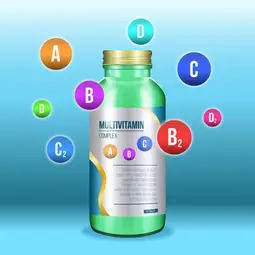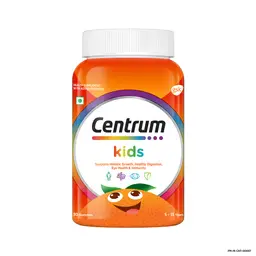The Power of Vitamin C: Benefits for Immunity, Skin, and Overall Health

The Power of Vitamin C: Benefits for Immunity, Skin, and Overall Health
Posted on 12th Jun, 2023
With the onset of COVID in 2019, vitamin C gained much recognition, and why not after all everyone who had strong immunity was said to be safe.
However, Vitamin C's fame extends beyond just being an immunity booster, as it offers a multitude of benefits, like iron absorption, healthy skin, and overall health improvement.
But that’s just not it, there’s so much more to this vitamin, that you need to know about vitamin C.
So let’s find out the importance of vitamin C and how it can positively impact our immunity, skin, and overall health.
What is Vitamin C?
Vitamin C, also known as ascorbic acid, is a water-soluble vitamin primarily found in citrus fruits and vegetables.
Unlike certain animals, humans cannot produce their Vitamin C on their own, emphasizing the importance of obtaining an adequate amount through diet or supplementation.
The question arises: how much Vitamin C is considered sufficient? According to the Recommended Dietary Allowance (RDA), adults aged 14 years and older should aim for a daily intake of 75 mg to 120 mg of Vitamin C.
It is essential to meet these requirements to prevent Vitamin C deficiency, which can lead to symptoms such as fatigue, weakened immunity, impaired wound healing, and a condition known as scurvy.
Additionally, Vitamin C's antioxidant properties play a crucial role in protecting the body against harmful free radicals and oxidative stress.
Importance of Vitamin C
Vitamin C plays a vital role in numerous physiological processes in the body. It supports the immune system, helps with the absorption of iron, aids in collagen synthesis, and acts as a powerful antioxidant.
These functions make it an essential nutrient for maintaining good health and well-being, so let's discuss more about its benefits in the next heading.
Top Benefits of Vitamin C
1. Helps to Reduce Your Risk of Chronic Disease
Vitamin C is known for its ability to strengthen the immune system, which plays a crucial role in defending the body against infections and diseases.
Studies have shown that regular consumption of Vitamin C can reduce the risk of chronic diseases, including heart disease, stroke, and certain types of cancer.
Its antioxidant properties neutralize free radicals, preventing cellular damage and inflammation that can contribute to these conditions.
2. Helps in Better Iron Absorption
Iron is an essential mineral required for the production of red blood cells and oxygen transport throughout the body. However, iron absorption from plant-based sources is not as efficient as from animal sources.
Fortunately, Vitamin C supplements can enhance the absorption of iron from plant-based foods.
Hence, consuming Vitamin C-rich foods, such as citrus fruits, alongside iron-rich foods, like spinach or lentils, can significantly improve iron absorption and help prevent iron deficiency anemia.
3. Helps Boost Immunity
Vitamin C is often associated with its immune-boosting properties. It supports the production and function of various immune cells, including white blood cells and antibodies, which are crucial for fighting off infections.
Regular intake of Vitamin C can reduce the duration and severity of common illnesses like the common cold.
By strengthening the immune system, Vitamin C helps keep us healthy and resilient.
4. Vitamin C Stimulates Collagen Synthesis
Collagen is a protein that provides structural support to our skin, bones, tendons, and ligaments. Vitamin C plays a pivotal role in collagen synthesis, promoting the production of this essential protein.
Adequate collagen levels contribute to healthy and youthful-looking skin, as it helps maintain its elasticity and firmness.
That's why Vitamin C is often used in skincare products, such as serums and creams, to support collagen production and protect against UV damage.
However, it's important to note that topical Vitamin C may have limited benefits for the skin. While it can provide some protection and stimulation to the skin's surface, its effectiveness is limited as very little of it can penetrate the skin's barrier.
Therefore, obtaining sufficient Vitamin C through dietary sources or supplements is essential for maximizing its benefits for skin health.
5. Vitamin C Protects the Eyes
Alongside its skin benefits, Vitamin C also plays a role in maintaining eye health. It is found in high concentrations in the lens and aqueous humor of the eye, acting as an antioxidant to protect against oxidative stress.
Research suggests that regular intake of Vitamin C may help reduce the risk of age-related macular degeneration (AMD) and cataracts, two common eye conditions that can lead to vision loss.
6. Vitamin C Helps in Cancer Prevention
Vitamin C plays a role in reducing the risk of certain types of cancer. As an antioxidant, it helps protect the body's cells from damage caused by harmful free radicals.
These free radicals can lead to DNA damage and mutations that contribute to the development of cancer.
By neutralizing free radicals, Vitamin C helps to prevent cellular damage and supports a healthy cellular environment.
7. Vitamin C Helps in Wound Healing
Vitamin C is essential for wound healing and tissue repair. It plays a crucial role in collagen synthesis, the protein responsible for the structure and strength of skin, tendons, and blood vessels.
Adequate Vitamin C levels are necessary for collagen production, which helps to close wounds and promote healing.
Additionally, Vitamin C's antioxidant properties protect cells from oxidative stress during the wound-healing process, supporting a faster and more efficient recovery.
Sources of Vitamin C
To reap the benefits of Vitamin C, it's important to incorporate foods rich in this nutrient into your diet.
Citrus fruits like oranges, lemons, and grapefruits are well-known sources of Vitamin C, including strawberries, kiwis, and papayas which provide a significant amount.
Additionally, Vitamin C supplements are the most viable sources to meet daily requirements.
Conclusion
Vitamin C is truly a powerhouse nutrient that offers a multitude of benefits for our immunity, skin, and overall health.
From its role in bolstering our immune defenses to promoting collagen synthesis and protecting against chronic diseases, its importance cannot be overstated.
By incorporating Vitamin C-rich foods into our diet or considering supplementation when necessary, we can harness the power of this vital nutrient and enhance our well-being for years to come.

Health articles from our experts

Top 10 Vitamin B12 Supplements

Vitamin B12 से भरपूर 8 फल

10 Best Biotin Supplements, According To a Dietitian

Is Biotin Good for Hair?

Multivitamins: The All-in-One Solution for Optimal Nutrition and Vibrant Living

Multivitamins for Hair, Skin, and Nail Health: Enhancing Your Natural Beauty

The Power of Vitamin C: Benefits for Immunity, Skin, and Overall Health

Vitamin ABCs: Understanding the Basics of Essential Vitamins

The Right Way To Get Vitamin D From Sun In India


